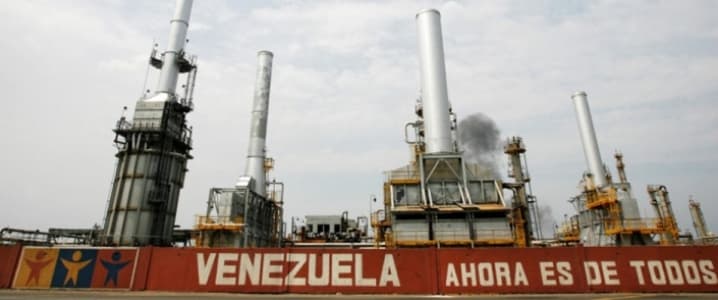As Venezuela’s foreign currency reserves have shrunk to $10.4 billion USD, so have the country’s goods in stock, against the background of gas, energy and medicine shortages, crime rates spiraling out of the government’s control and popular dissatisfaction building up across all sectors of society. The scarcity of the Maduro era is reflected in Venezuela’s oil output volumes, which since 2011 have fallen by almost 500 000 barrels per day to 2 mbpd and will sink to an even greater degree with Caracas’s obligation to reach 1.972 mbpd within the framework of the OPEC/non-OPEC Vienna Agreements. While Maduro have managed to avoid any major political destabilization by tightening control on the nation’s natural resources and is intent to see his 5-year tenure run out peacefully in 2018, his chances of retaining the post of Venezuela’s President beyond 2018 are close to naught.
The latest moves signal that on a mid-term horizon the Venezuelan military might be on the verge of taking over the oil sector. After President Nicolas Maduro created CAMIMPEG (Military Company of the Mining, Oil and Gas Industries) in February 2016, PDVSA was compelled to conclude several servicing contracts with the newly-created entity. It should be stated that the physical security at Venezuela’s oil sites has worsened palpably throughout the last few years (reflecting the general trend in the country), with paramilitary gangs raging even in oil-producing states such as Zulia, however, the merging of Venezuela’s military with the state-owned oil sector goes beyond this. Leading members of the Venezuelan army have been nominated to high-ranking posts within PDVSA, replacing oil-sector savvy for a military mindset. Related: Asia’s Top LNG Players Forming Buyers Club
Admiral Mirabel Parra, a close associate of the late Hugo Chavez, formerly in charge of the Army’s transportation company, was named in February 2017 as the vice-president of PDVSA to “support” the head of PDVSA, Eulogio del Pino. Guillermo Blanco Acosta, Chavez’s long-time army companion, was declared Head of PDVSA Refining by the same decree, which postulated one of its aims as “cleansing the company of all corruption”. Not all state-designated newcomers in PDVSA are former military commanders and officers, some are (allegedly) confidants of Tareck el-Aissami, Venezuela’s Vice President who has already been introduced to the U.S. Sanctions list. One of such is Ismel Serrano, the new Head of Commerce, a man of whom very little is known apart from the fact that he worked with el-Aissami. Venezuela’s Vice President is alleged to have developed a well-working web of contacts whilst working as Minister of Interior and Justice between 2008 and 2012, therefore his rise to prominence is not inconsistent with the consolidation of the military’s clout.
By itself, the establishment of a military-controlled oil services company and the nomination of several military commanders into oil managerial positions is by no means a game-changer for Venezuela, yet against the background of this oil-rich nation’s fraught social fabric they might be indicative of a future military-led development course. For instance, the establishment of CAMIMPEG happened on the back of leading service companies (e.g.: Schlumberger) leaving Venezuela because of PDVSA’s chronic liquidity problems. Therefore, the new entity is functioning in a less competitive environment, from which many rival companies were squeezed out or decided to leave due to lack of prospects. It has also been rumoured that in case a long-mooted debt default cripples the government’s powers (Caracas is expected to pay a total of $9.2 billion of maturing debt throughout 2017, with the largest payment scheduled for April), CAMIMPEG might shield oil assets from seizure.
While defaulting on its debt is by no means imminent, the awkward financial situation for Venezuela will continue as oil prices – more than 95 percent of the country’s export income – are very unlikely to reach the 110 USD/bbl level Venezuela needs to balance its budget. If Maduro is no longer capable to govern Venezuela (e.g.: PDVSA’s debt default entails the disintegration of state power), the military could step in and take advantage of Chavez’s army legacy, which Maduro could not, promising strict enforcement of rule of law and order. Venezuela’s people would most likely not revolt if physical security conditions are demonstrably improved across the country and access to basic products is reformed. Related: OPEC Weighs Extension As Oil Markets Start To Lose Their Nerve
Yet external conditions might give a further twist to Venezuela’s fate, as it still remains unclear whether State Secretary Rex Tillerson will render U.S. policy vis-à-vis Venezuela more aggressive. This is by no means an implausible presumption, since it was under Tillerson’s ExxonMobil tenure that Hugo Chávez nationalized all of the company’s assets. Although the World Bank Arbitration tribunal in 2014 ordered Venezuela to pay $1.6 billion as compensation, much less than the $10 billion ExxonMobil sought, it ruled that the seizure of assets was not “illegal” (implying PDVSA did not have to pay any prejudice). Thus, a decade-long grudge might have a certain amplifying effect on Tillerson’s treatment of Venezuela, Chávez at the time probably did not know that he would be calling the future State Secretary a “bandit” and an “imperialist white-collar thief”. Of the many unknowns – the opposition between Chavista hard-liners and the liberal opposition, Venezuela’s financial viability etc. - one thing is certain,
Venezuela’s next few years will be very eventful.
By Viktor Katona for Oilprice.com
ADVERTISEMENT
More Top Reads From Oilprice.com:
- Oil Prices Inch Higher After API Reports Moderate Crude Build, Gasoline Draw
- Oil Prices Recover As OPEC Extension Seems Likely
- Wind Energy Now Directly Competing With Coal On Cost


















